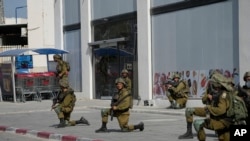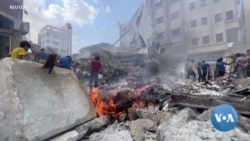Analysts point to numerous security failures by Israel’s intelligence and military apparatus ahead of Hamas’ unprecedented attack on Israel.
Andrew England, Middle East editor of London’s Financial Times, expressed surprise at the Iran-backed Hamas militants’ ability to launch coordinated attacks from Gaza, hemmed in by Israeli military fences and checkpoints. Both the United States and European Union have designated Hamas as a terrorist organization.
England writes, “Hamas’s deadly, carefully planned and multi-faceted operation has unleashed Israel’s most terrifying nightmare: civilians finding themselves on the front lines of the protracted conflict as their homes became war zones. He says it “suggests a massive intelligence failure that will send shockwaves—and fear—through Israeli society.”
Natan Sachs directs the Center for Middle East Policy at Washington’s Brookings Institution. He told an online audience this week that a “deep crisis of trust in the Israeli state and military” now exists among Israel’s traumatized populace.
Sachs, like others, expects a tough Israeli response from both to Hamas.
“There is a willingness, a demand even in Israel to incur costs that would not have been, even in the past," Sachs said. "This is going to be a terrible time in the Gaza Strip. I am almost certain it will enter militarily in the ground forces. The calls in Israel to topple Hamas now are loud, I do not know if they will win the day, but I would not rule it out.”
Other observers say that Israel had concentrated troops in the West Bank and further north in anticipation of a flare-up of violence there, rather than near the southern border with Gaza. They note the current hard-right Israeli government’s push to overhaul the supreme court, drawing months of fierce protests from citizens, including army reservists, also may have been perceived as weakness by Hamas.
“Hamas must be made to pay for its atrocities,” writes The Economist’s Patrick Lane. “But it is also clear that Benjamin Netanyahu’s long-pursued policy of ignoring Palestinians’ aspirations to sovereignty is in tatters.”
While Israel is known for its cutting-edge defense systems that include the Iron Dome missile interception system and drones, former CIA officer on the Middle East, Bob Baer told CNN that neither the U.S. nor Israel have good intelligence on Hamas and its plans.
“They’re not up on cell phones. There’s no meta data on these people. So, this has become a very disciplined organization," Baer said. "The Israelis don’t have any good human sources inside Gaza. Otherwise, they would have found out about this. It’s really, very much a black hole for the Israelis. Simply bombarding Gaza is going to risk a regional war.”
A rocket attack from Lebanon into northern Israel late Tuesday into early Wednesday raises concerns about a wider danger.
Brookings’ Sachs said one of the most important policy considerations is to make sure Lebanon’s Iran-backed Hezbollah stays out of this conflict.
“Hezbollah is more powerful than Hamas by far, and Israel’s response in Lebanon, I fear, would be absolutely devastating in a country that’s already reeling from enormous domestic crises. If Hezbollah decides to join, I don’t think Iran will," Sachs said. "We will see huge devastation in the north, precisely because Israel feels so cornered.
Karim Emile Bitar of the Geneva Center for Security Policy told France24 that while Hamas could have planned this alone, it appears Iran provided support—a claim Tehran denies.
“I think Iran has been growing increasingly nervous because of the ongoing Saudi Israeli rapprochement,” Bitar said, which could explain “this turning point in the Israeli-Palestinian conflict.”









